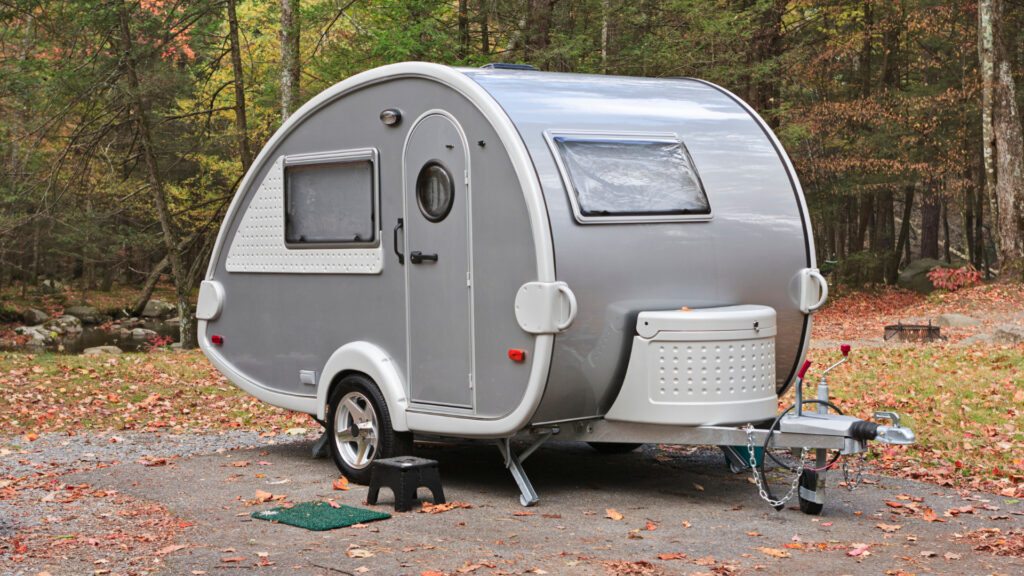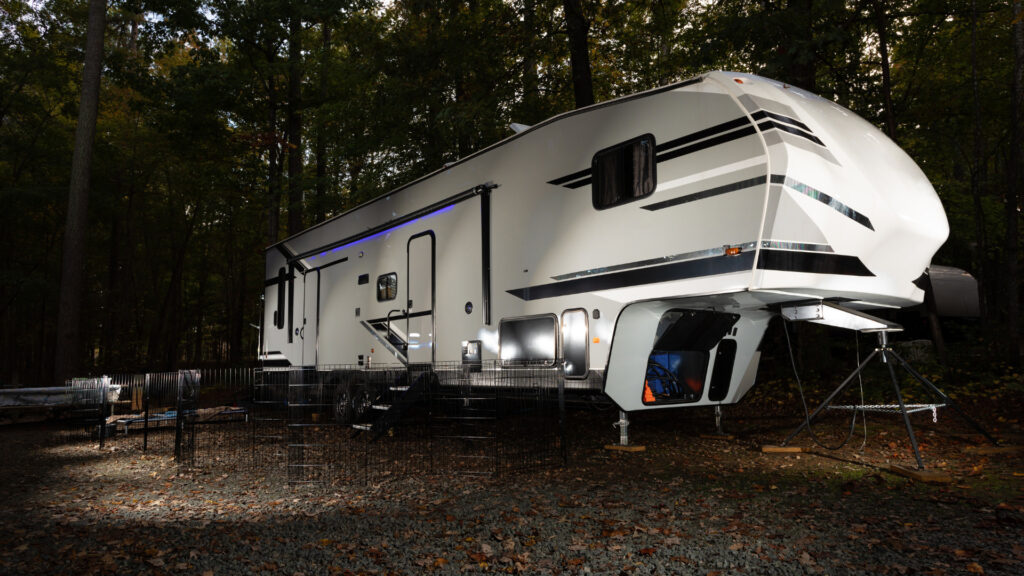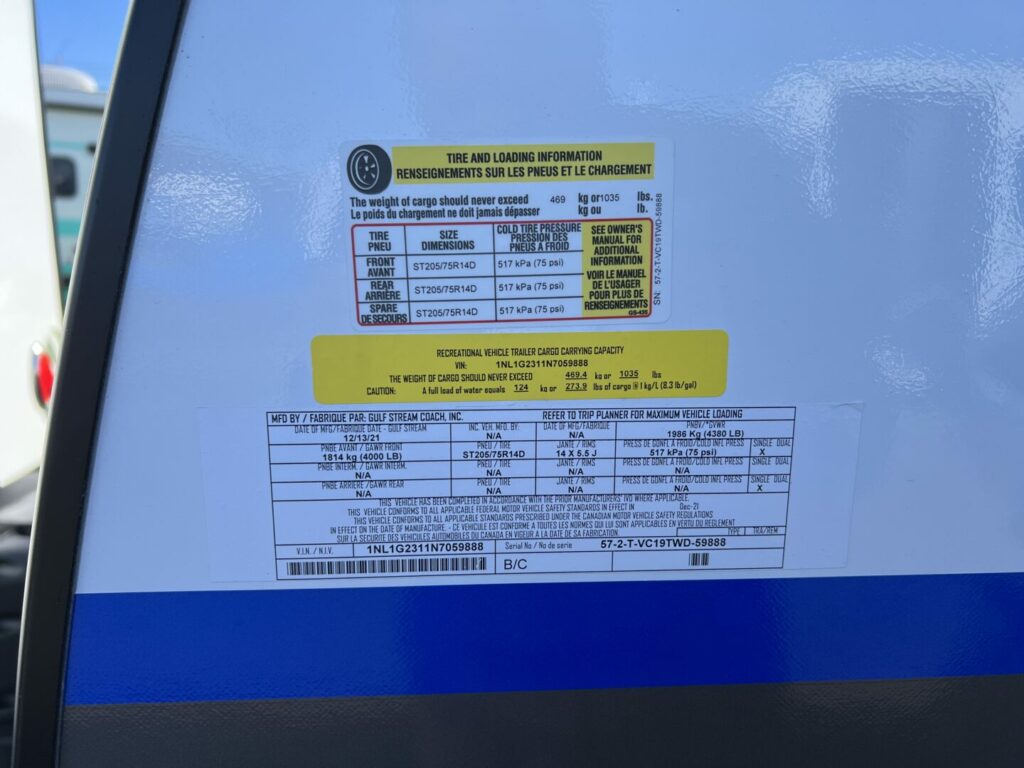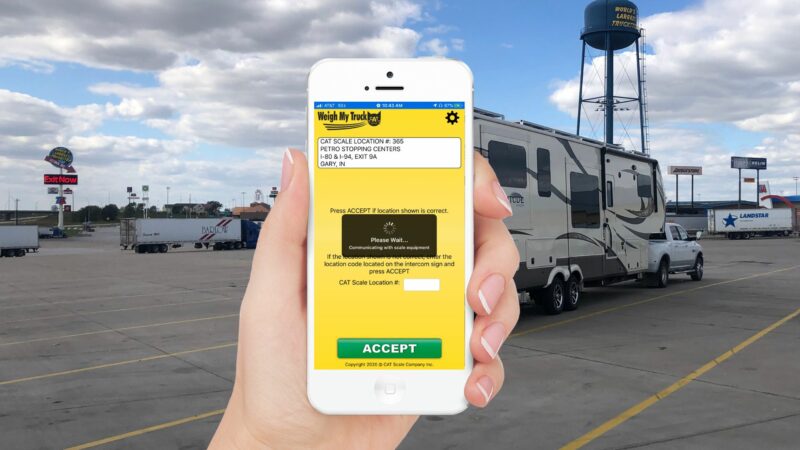Table of Contents Show
If you’re in the market for a new-to-you RV, you’ll need to get familiar with its camper weight statistics. It’s not enough to think about what items you’ll bring with you and where they’ll fit in the RV. You also need to consider the weight of all those items.
Today, we’ll go over why camper weight matters. And, we’ll share some weight ranges of popular RV models.
By the end, you’ll have a better understanding of camper weight terms so you can confidently continue on your RV search.
Let’s get started.
Why Is Camper Weight Important?
One of the most important things to consider when hauling an RV is its weight.
You mustn’t add too much to your RV and put it beyond its capacity.
It’ll add too much pressure on the frame, axles, and tires. And it impacts your towing, putting you at risk for accidents.
You can also sway more if you have too much weight near the rear. If you have too much weight near the front, it can lead to poor braking and impact turning corners.
If you knowingly overload your camper based on its weight, you could void any RV warranty you have.
And, you run the risk of legal issues if you get in an accident and the insurance company deems the extra weight played a factor.
What Is the Average Weight of a Camper?
Campers vary considerably in weight.
Let’s go over several types of RVs.
All of these on this list are estimates of the unloaded weight, meaning without any cargo.
Average Teardrop Camper Weight
The lightest RV, a teardrop camper, is named for its distinct shape – it has a round front that tapers off in the back.
It ranges in weight from a light 500 to 3,000 lbs unloaded.
Pull up your crossovers and SUVs to haul these babies because their small weight means you don’t need a heavy-duty truck for towing.

Average Pop-Up Camper Weight
Next up is the pop-up camper, which ranges from 1,400 to 4,000 lbs unloaded, with an average of 2,300 lbs.
Pop-ups are small and fold-out during set-up. Their compact size makes them easy to pull.
They typically weigh more than a tear-drop RV, but you can often tow them with a smaller SUV or light-duty truck.
Keep in Mind: Distribute the weight of your camper with the best weight distribution hitch to tow your RV safely
Average Travel Trailer Weight
Travel trailers range from shorter models to much longer ones, even up to 41 ft.
As such, their weight varies considerably too. You can find some for as little as 1,200 lbs to just under 10,000 lbs unloaded.
Travel trailers connect to your tow vehicle via a tow ball.

Average Fifth Wheel Weight
A fifth wheel has a kingpin that connects to a hitch in the truck bed.
As one of the largest sizes of towable RVs, you’ll need a truck to tow them.
Fifth wheels average 5,000 to 16,000 lbs unloaded.
Average Toy Hauler Weight
Toy haulers mix RVs and cargo trailers.
It has an area where you load your “toys,” like bikes, off-road vehicles, motorcycles, etc.
Then, it has a living space – sometimes separated by a wall but not always.
You can find travel trailer toy haulers and fifth wheel toy haulers.
Fifth wheel toy haulers typically weigh more.
Toy haulers range in weight from 3,500 to 11,000 lbs unloaded.

Understanding Camper Weight Terms
The RV community throws around a lot of terms and abbreviations when it comes to camper weight.
Let’s go over the most common ones.
Check your specific manual to determine how your RV manufacturer defines each of these.
Unloaded Vehicle Weight (UVW)
Unloaded vehicle weight (UVW) is the vehicle’s weight as it leaves the factory.
It includes all the vehicle components, plus full fluids and fuel if it’s a vehicle or driveable RV.
You can typically assume your unloaded vehicle weight is the weight of the RV, minus any cargo, water, propane, or people in it.
You also might hear this referred to as “dry weight.”
Cargo Carrying Capacity (CCC)
Are you one of those campers that bring everything but the kitchen sink?
Although you might have room in your cupboards and drawers for all your gear, you might not have enough cargo carrying capacity.
Cargo weight, or your payload capacity, is anything beyond your UVW.
This will include your camping gear, food, clothes, propane, tank water, and even your tongue and kingpin.
Remember that a gallon of water equals just over 8 lbs.
Keep this in mind if you like to drive with water in your tanks en route to your camping destination.
Keep in Mind: It’s super easy to install your MORryde Sliding Cargo Tray on your own! Let’s dive in!
Gross Vehicle Weight (GVWR)
Your gross vehicle weight rating, or GVWR, is the safest amount that your vehicle can weigh.
This includes your cargo, tongue-and-pin, plus whatever propane, freshwater, and wastewater you carry.
If you have a driveable RV, it also consists of the passengers’ weights.
How Much Towing Capacity Do I Need for a Camper?
You never want your fully-loaded vehicle weight to equal your gross vehicle weight (GVWR).
Never go over this amount. In fact, for safety reasons, we recommend your fully-loaded RV isn’t within 10% of your GVWR.
You can face problems on your vehicle, RV, or while towing.
You may also have issues on roads with weight limits.
How Do I Find the Camper Weight?
You can find the RV weight on the specifications page, where you’d find the tank sizes and RV length listed.
You can also find it on a sticker on the RV. Look to the exterior of your driver’s side for the listed GVWR.
You can also look to your RV’s door jamb for a yellow sticker that’ll list the cargo carrying capacity (CCC) and unloaded vehicle weight.
You can often find these in your owner’s manual as well.

Average Camper Weight Is a Broad Spectrum
You might like to research the attractive things about an RV, like its storage space, sleeping capacity, and fridge size. But knowing your camper weight before buying it is worth your time and energy.
This helps you understand how much you can bring on your camping trips. And, it helps ensure you have a proper-sized tow vehicle for safe handling. Although RV weights vary considerably, you can find a range of styles to fit your lifestyle and needs.
How much cargo weight do you need in an RV?






